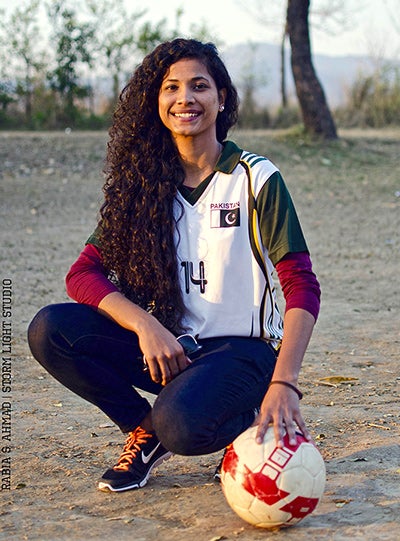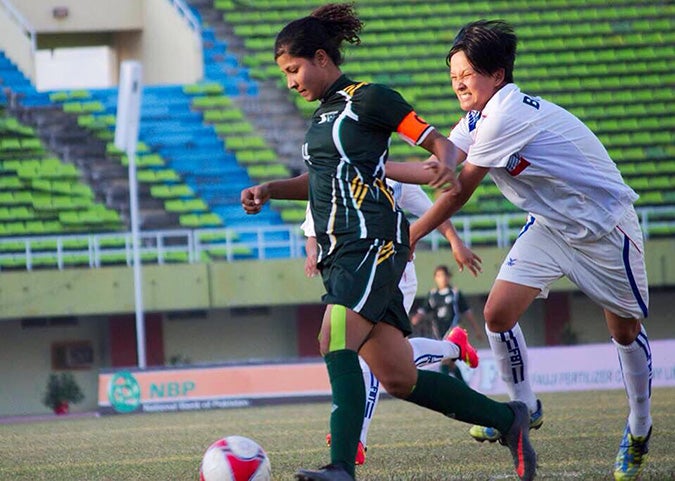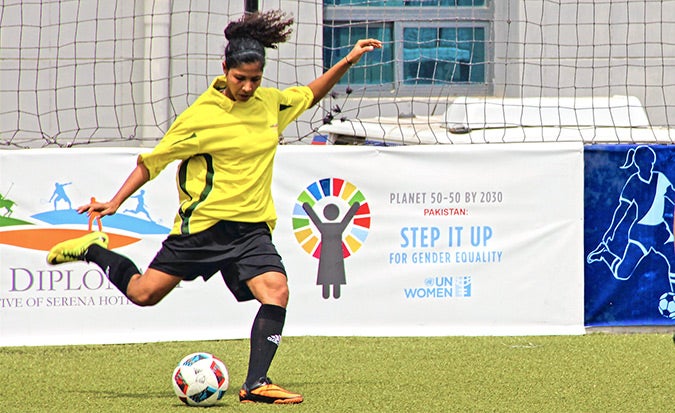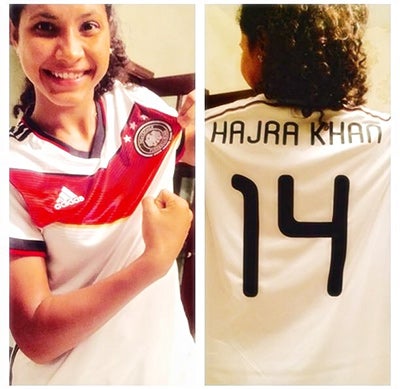Triumphing gender stereotypes with skills
Q&A with Hajra Khan, Captain of Pakistan’s Female National Football Team, and first Pakistani female football player to try out for three professional German Bundesliga clubsDate:
Author: Henriette Bjoerge

The German football team is getting cheers, chants and support in the UEFA EURO 2016 from female football players in Pakistan: “I really hope they become the winner of the EURO Cup!” says Hajra Khan enthusiastically.As Captain of Pakistan’s Female National Football Team and a multi-talent within sports, she made history when she became the first Pakistani female footballer to sign a contract to play abroad in the Maldives National Women’s League in 2014. And similarly, last year she became the first Pakistani female football player to try out for three professional German Bundesliga clubs; SGS Essen, FSV Guterslohand and VFL Sindelfingen. Although Hajra did not end up playing professionally in Germany, her heart is close to German football, and it is safe to say she might be their biggest supporter in Pakistan throughout the European Championships.
During her participation at UN Women’s recent celebration of the ‘UN International Day of Sport for Development and Peace’ in Islamabad, Hajra sat down between matches for a Q&A.
As Captain of the Female National Football Team of Pakistan, what would you highlight as your team's main challenges in a male dominated sport?
Hajra: There are lack of opportunities for players to grow and hone their talent by participating internationally, and safe spaces to train regularly are definitely scarce. Also, as athletes and individuals working passionately for the promotion of football, having people value talent and hard work of the players other than anything else, like their looks, has been quite a challenge. Every girl or woman who plays sports knows the unfairness. No matter how skilled or talented, every female knows her appearance will be judged as she plays her sport. She may win, she may lose, but her looks will be assessed. Some benefit from it, most resent it, but all female athletes have to grapple with it. In the end the only way to silence the beauty obsession of the gaze lies in the triumph with skill.

How has football shaped you to become who you are today?
Hajra: I've always been a very quiet and composed person, but I do believe sports in general has played a vital role in development of my personality as well as other aspects including respect for oneself and others, fairness, grace in defeat, humility in victory, and the virtue of self-denial.
I've learned to take a little more than my share of blame and a little less than my share of credit. It's helped me gain respect for my body and develop self-esteem, and to believe that I have everything I need within me to become the best possible version of myself.
I've formed long lasting bonds and with the benefit of relatively greater leadership, self-confidence, and self-respect there's an urge to give back to broader social goals.
Has it been difficult for you to get acceptance as a female football player in Pakistan?
Hajra: It's not easy for women in Pakistan to pursue their dreams because of social pressures and unacceptability from people around us. There's still prejudice and that resistance regarding women, not only on female football but in various activities. Thankfully, I've had consistent support from family and friends ever since I started playing sports as a child. It's been a tough journey but I've fought stereotypes and broken any barriers that came in my way and proved that a female in Pakistan, with hard work and determination, can achieve more than any man has in this 'male-dominated sport' up until now.
How important do you think it is to highlight female athletes who are ‘stepping it up’ and breaking gender barriers in Pakistan?
Hajra: I believe it is monumentally important as there’s a general lack of support for girls who want to do more than just get married and become homemakers. Girls face many obstacles, including lack of access to quality and affordable education and they face cultural barriers.
Consequently, their freedom of movement and pursuit of their dreams is restricted to a great extent in any field. While there exist some exceptions, a vast majority of the women are not exposed to equal opportunities and avenues in order to express themselves.
As a pioneer of women’s football in Pakistan, I’ve witnessed an increase in the participation of women in sports, but female athletes still face scrutiny and stereotyping because of social norms - which define women as being fragile, less capable, and passive. Furthermore, sport has always been seen as a masculinized entity, and therefore, women are perceived as intruding on male boundaries.

In order for women to have true equality in sport, the media will need to begin to recognize women for their athletic ability and not their looks or personal life alone, but also, society will need to move away from the social conditioning of women into gender stereotyped roles and allow for young girls to choose their own path, especially if that includes an interest in sports.
While the initiative to present an opportunity for females to participate in sports is commendable, there is a general consensus that more efforts are needed. Investments to uplift the standard of the game and the officials involved as well as increase the publicity to reach women of all backgrounds are essential. Initiatives such as those by UN Women are excellent examples to educate and empower girls and women.
What are your plans for the future?
Hajra: Staying focused and training hard day and night has helped me achieve my ultimate goals of becoming the best in Pakistan and leading the National Team, to playing club football internationally in Maldives and experiencing European football in Germany.

I plan to use my achievements to be an outspoken advocate for the growth of women's game in Pakistan. I'm currently pursuing a Bachelor’s degree in Business and Management from London School of Economics and have an AFC 'C' License Coaching Certificate. There is lack of sufficient avenues for micro and youth football skill development. Therefore, I have come up with a plan to launch a football training academy, primarily geared at training female players including the grassroots’ level. The academy will also use football for development, and work towards social inclusion of disabled youth into mainstream society. Further, it will include children of the streets and underserved areas with the aim to become proactive leaders in their individual lives and in their communities through promotion of gender equality, access to education and health services. I believe in never settling for my achievements, and for Pakistan, I will serve for as long as I can.
For more information:
Please contact: Henriette Bjoerge
Communications and Advocacy Officer, UN Women Pakistan.
E-mail: [ Click to reveal ]